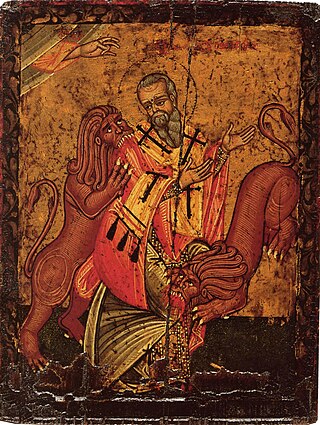
The word catholic comes from the Greek phrase καθόλου 'on the whole, according to the whole, in general', and is a combination of the Greek words κατά 'about' and ὅλος 'whole'. The first known use of "Catholic" was by the church father Saint Ignatius of Antioch in his Letter to the Smyrnaeans. In the context of Christian ecclesiology, it has a rich history and several usages.
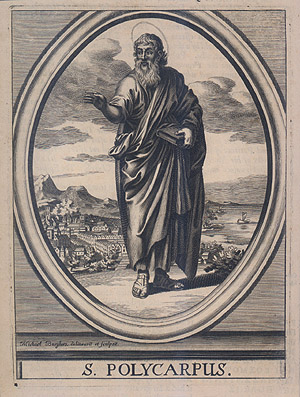
Polycarp was a Christian bishop of Smyrna. According to the Martyrdom of Polycarp, he died a martyr, bound and burned at the stake, then stabbed when the fire failed to consume his body. Polycarp is regarded as a saint and Church Father in the Catholic, Eastern Orthodox, Oriental Orthodox, Anglican, and Lutheran churches.
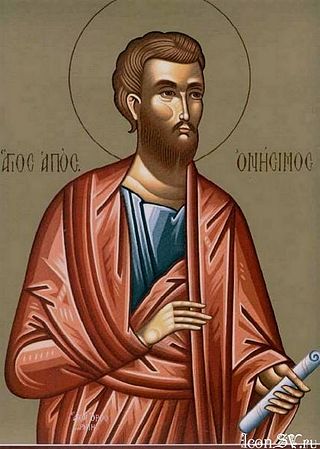
Onesimus, also called Onesimus of Byzantium and The Holy Apostle Onesimus in the Eastern Orthodox Church, was probably a slave to Philemon of Colossae, a man of Christian faith. He may also be the same Onesimus named by Ignatius of Antioch as bishop in Ephesus which would put Onesimus's death closer to 95. If so, Onesimus went from slave to brother to bishop.
Saint Simeon, Saint Symeon or Saint-Siméon may refer to:

Doctor of the Church, also referred to as Doctor of the Universal Church, is a title given by the Catholic Church to saints recognized as having made a significant contribution to theology or doctrine through their research, study, or writing.
The Apostolic Fathers, also known as the Ante-Nicene Fathers, were core Christian theologians among the Church Fathers who lived in the 1st and 2nd centuries AD who are believed to have personally known some of the Twelve Apostles or to have been significantly influenced by them. Their writings, though widely circulated in early Christianity, were not included in the canon of the New Testament. Many of the writings derive from the same time period and geographical location as other works of early Christian literature which came to be part of the New Testament.

The purpose of this timeline is to give a detailed account of Christianity from the beginning of the current era (AD) to the present. Question marks ('?') on dates indicate approximate dates.
Saint Theodore may refer to:
Saint Alexander may refer to one of several saints including:

The Reformation in Denmark–Norway and Holstein saw the transition from Catholicism to Lutheranism in the realms ruled by the Danish-based House of Oldenburg in the first half of the sixteenth century. After the break-up of the Kalmar Union in 1521/1523, these realms included the kingdoms of Denmark and Norway and the Duchies of Schleswig and Holstein, whereby Denmark also extended over today's Gotland and Øsel in Estonia.

The following outline is provided as an overview of and topical guide to Christianity:

Lutheranism is a major branch of Protestantism, identifying primarily with the theology of Martin Luther, the 16th-century German monk and reformer whose efforts to reform the theology and practice of the Catholic Church launched the Protestant Reformation.
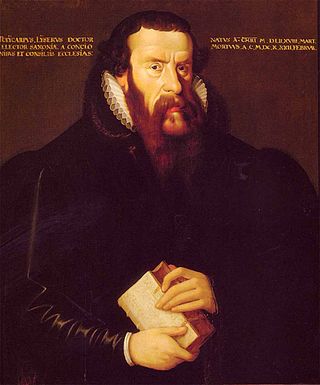
Polykarp (von) Leyser the Elder or Polykarp Leyser I was a Lutheran theologian, superintendent of Braunschweig, superintendent-general of the Saxon church-circle, professor of theology at the University of Wittenberg and chief court-preacher and consistorial-councillor of Saxony.
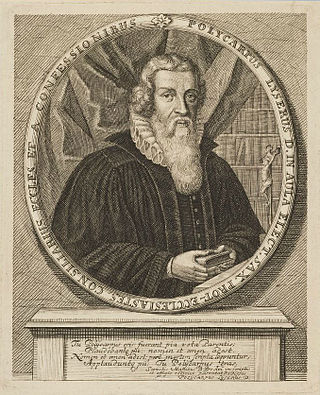
Polykarp Leyser II was a German Lutheran theologian and superintendent in Leipzig. He was professor of theology since 1613.
Polykarp Leyser may refer to:

Polykarp Leyser III. was a German Lutheran theologian, superintendent, chaplain (Oberhofprediger), and orientalist.

The Church Fathers, Early Church Fathers, Christian Fathers, or Fathers of the Church were ancient and influential Christian theologians and writers who established the intellectual and doctrinal foundations of Christianity. The historical period in which they worked became known as the Patristic Era and spans approximately from the late 1st to mid-8th centuries, flourishing in particular during the 4th and 5th centuries, when Christianity was in the process of establishing itself as the state church of the Roman Empire.

Articles related to Christianity include:

The Metropolis of Smyrna is an ecclesiastical territory (diocese) of the Ecumenical Patriarchate of Constantinople, modern Turkey. The Christian community of Smyrna was one of the Seven Churches of Asia, mentioned by Apostle John in the Book of Revelation. It was initially an archbishopric, but was promoted to a metropolis during the 9th century. Although the local Christian element was reduced during the 14th and 15th centuries, it retained its ecclesiastical autonomy continuously until 1922.
This page is based on this
Wikipedia article Text is available under the
CC BY-SA 4.0 license; additional terms may apply.
Images, videos and audio are available under their respective licenses.











